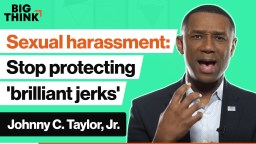GRETCHEN CARLSON: So trying to fix the whole issue of sexual harassment in our society is a tangled web. I didn't even know that when I set out on my journey in July of 2016. And so there's not really any easy fix. And as a result one of the key components I believe is the way in which we choose to raise our children because that's where it really all starts. What I found out over the last couple of years is that we spend an inordinate amount of time trying to empower our young girls and we do a really great job with that. There are tons of organizations out there that do good work.
But when we talk about sexual harassment as only a girl or women's issue we're really doing a disservice to it, because quite honestly it's really a man's issue. You know the preponderance of predators are men, and in the way in which we call it a "women's issue," first of all, there's almost a negative connotation that comes with that, unfortunately. And the other variant with that is that men just tune out. They just are like "Oh, I don't have to worry about that." And so with our sons we keep thinking that the way in which we're going to fix this problem is to empower our young girls more. But we're already doing a great job at that.
So really where we need to be focused is: what are we telling our sons? How are we teaching them to respect young girls who are their colleagues in school growing up, young women who are with them on college campuses, and then young women who are with them eventually in the workforce. Because if we don't get to our boys young, to instill that respect, it's almost too late to try and change when men are in their thirties and forties and fifties and onward. Recently I just read an article about how men are fearful about this whole Me Too era and they're not going to hire women anymore. They're not going to take them out to business dinners or spend time with them alone. And to me that's really a copout. We should be teaching our young boys that this is how you behave when you're in the company of a woman, and that's when you're at a restaurant and that's when you're in the workplace. So men know how to treat women! But teaching our young boys is an essential part of this equation.
I don't know if during middle school boys have the capability yet to really assess completely that the stats show that one in five girls will be raped on a college campus (and that they may be actually one of those boys that end up doing that). But I do think that it goes back to the whole parenting issue and having the courage to have these conversations with your children. And quite honestly I believe that there should be curriculum in school where this is something that, from fourth grade on or fifth grade on, that this is part of sex education. Listen, the kids are learning about everything else in school.
I was stunned to find out what my kids were being taught about sex in school, but they need to be! Because this is what's going on in our world right now.
So I guess the conclusion I've come to is that you have to tackle this head on, have the courage to have these conversations and not just say, "Well, somebody else can do the work for me."
But as the parent you have to be the one that's setting the tone. From a boy's perspective I can't know or understand boys who end up being predators what happens along the way that makes them choose those paths. But I have to believe that, if more parents had these conversations earlier on and set examples of the way in which they live their own lives, that the world would be a better place. So I have to believe that in having more conversations now, especially in this Me Too era, that we are making the world a better place for our younger generations that are coming up.
I mean quite honestly that's why I did what I did. It was for my children and for everyone else's children. Because when my career (that I killed myself for after 25 years) was going to be taken away and it wasn't my choice, I said to myself in the mirror one day, "If I don't do something about this, if I don't stand up and say something about this, who will?"
And in the end after the years that have passed, it's really about the younger generations. That's why I've continued on this path of doing so much work on behalf of the harassment issue. Because it truly is about eradicating it for the next generations. I think that we thought we had already fixed that in my generation. And one of the reasons that this Me Too movement has carried on for as long as it has, is because I believe the American public was so dismayed and upset at these stories when they started coming out, because they too thought we had fixed this!
One of the reasons why the American public has not known about this is because as a society we have chosen to keep the issue of harassment and abuse secret. And that is either through settlements (where the women can never tell you what ever happened to them) or in arbitration, which is where the majority of employees are forced into now—which is a secret chamber if they happen to go and complain about this in their workplace.
They don't have the ability to go to an open court system. And so for the last twenty-some years, if you had the courage to come forward and complain about harassment, you were oftentimes put into forced arbitration which meant nobody ever, every learned about your story. And the worst thing is you never work again, and your predator gets to stay working on the job, because nobody knows about it! So this is why I've been so active on Capitol Hill trying to get new legislation passed to make this change. But that's the reason why the American public has not known about these stories.





